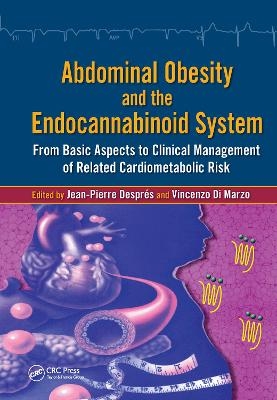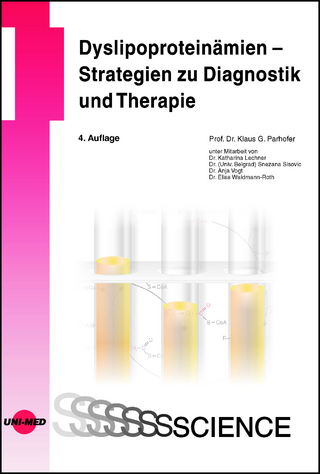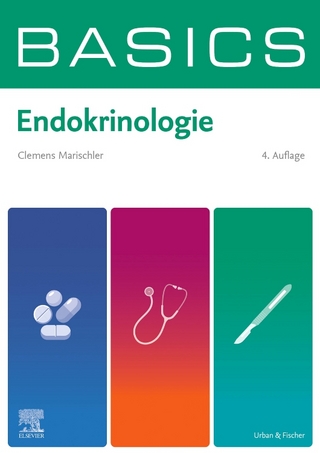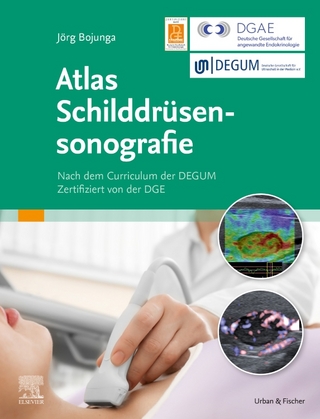
Abdominal Obesity and the Endocannabinoid System
Crc Press Inc (Verlag)
978-1-4200-6084-3 (ISBN)
This internationally renowned author team provides a unique and thorough analysis and distillation of the endocannabinoid system and its relationship to abdominal obesity, diabetes, and cardiovascular disease. The endocannabinoid system (ECS) plays an important role in cardiometabolic risk, as well as modulating energy balance, feeding behavior, hepatic lipogenesis, and perhaps glucose homeostasis. Evidence suggests that the ECS is overactive in human obesity and dyslipidemia.
Critical to the management of cardiometabolic risk, this new, timely book provides practical overviews and management guidance on many important topics, including:
abdominal obesity and the metabolic syndrome
the endocannabinoid system and energy balance: functions and dysfunctions
abdominal obesity, the EC system, and cardiometabolic risk
JEAN-PIERRE DESPRÉS is Professor at the Division of Kinesiology of the Department of Social and Preventive Medicine at Université Laval, Québec, Canada. He received his Ph.D. in Exercise Physiology from Université Laval and then pursued a post-doctoral training at the Department of Medicine of the University of Toronto. Dr. Després is Director of Research at the Québec Heart Institute in Québec City and holds the position of Scientific Director of the International Chair on Cardiometabolic Risk, a multi-disciplinary academic organisation based at Université Laval. Dr. Després has been the Editor for the International Journal of Obesity from 1992 to 2000, and he is currently a member of the editorial boards of several scientific journals He also serves on the board of numerous organisation and has been the recipient of many awards. Dr. Després has published more than 480 papers in peer-reviewed journals and has written 50 book chapters. VINCENZO DI MARZO is Research Director at the Istituto di Chimica Biomolecolare, Pozzuoli (Naples), Italy, and Adjunct Associate Professor at Department of Pharmacology and Toxicology, Virginia Commonwealth University, Richmond, Virginia, USA. Dr. Di Marzo received his first degree in chemistry from the University of Naples "Federico II", in Italy, and his Ph.D. in biochemistry from the Imperial College of Science. Technology & Medicine, London, UK. Among his many achievements, Dr. Di Marzo was the principal investigator of a Human Frontier in Science Organization grant and past president of the International Cannabinoid Research Society, and founded the Endocannabinoid Research Group, in which several laboratories working on endocannabinoids in the Naples area converge. He has coauthored over 340 articles in peer-reviewed scientific journals. In 2007 he received the Mechoulam Award for "his outstanding contributions to cannabinoid research".
Preface. Intro. Health Hazard of Obesity. Abdominal Obesity and the Metabolic Syndrome: An Int'l Perspective. Abdominal Obesity and the Metabolic Syndrome. Abdominal Obesity, Metabolic Syndrome, and CVD. Abdominal Obesity in Type 2 Diabetes. Abdominal Obesity in Cardiology. Abdominal Obesity and Sleep Apnea.
Abdominal Obesity and Hypertension. Visceral Adiposity, IR, and Type 2 Diabetes. Visceral Adiposity, Liver Fat, and Atherogenic Dyslipidemia. Visceral Adiposity and Inflammation. Visceral Adiposity and Fibrinolysis-Thrombosis. Visceral Adiposity, Menopause, and Related Cardiometabolic Risk. Visceral Adiposity, Ethnicity and Related Cardiometabolic Risk. The Endocrine Function of Adipose Tissue. FFA Metabolism in Visceral Obesity. Liver Fat and Visceral Obesity. Animal Models of Visceral Obesity. FFA Metabolism and Visceral Adiposity. Physical Activity / Exercise.
Is there an Optimal Diet for the Mgt of Visceral Obesity. Can we Change the Lifestyle of High-Risk Patients. Can We Change the Body Fat Distribution Phenotype? Lessons from PPARgamma Agonists. Can We Change the Body Fat Distribution Phenotype? Lessons from studies in Transsexuals. Subcutaneous Fat as a Metabolic Risk. The EC System and Central Control of Energy Balance -- Appetitive Aspects. The EC System and Central Control of Energy Balance -- Consommatory Aspects. The EC System and the HPA Axis. The EC System and Satiety. The EC System in the GI Tract. The EC System in the Adipose Tissue and Endocrine Pancreas. The EC System in the Immune System. The EC System in the Liver. The EC System and Cardiovascular Func. The EC System, Energy Expenditure. Potential Impact of the Diet. The Overactive EC System. The Overactive EC System. CB1 Blockade in the Mgt of Abdominal Obesity. CB1 Blockade, Insulin Resistance and Type 2 Diabetes. CB1 Blockade in Atherogenic Dyslipidemia of AO. CB1 Blockade and Hypertension. CB1 Blockade to Prevent Type 2 Diabetes. Future Developments 1. Future Developments 2. Conclusions and Clinical Perspectives.
| Erscheint lt. Verlag | 24.11.2008 |
|---|---|
| Zusatzinfo | 16 Tables, black and white; 15 Halftones, black and white; 42 Illustrations, color; 51 Illustrations, black and white |
| Verlagsort | Bosa Roca |
| Sprache | englisch |
| Maße | 178 x 254 mm |
| Gewicht | 725 g |
| Themenwelt | Medizin / Pharmazie ► Gesundheitsfachberufe ► Diätassistenz / Ernährungsberatung |
| Medizin / Pharmazie ► Gesundheitswesen | |
| Medizinische Fachgebiete ► Innere Medizin ► Endokrinologie | |
| Medizinische Fachgebiete ► Innere Medizin ► Kardiologie / Angiologie | |
| Studium ► 1. Studienabschnitt (Vorklinik) ► Biochemie / Molekularbiologie | |
| Naturwissenschaften ► Biologie | |
| ISBN-10 | 1-4200-6084-8 / 1420060848 |
| ISBN-13 | 978-1-4200-6084-3 / 9781420060843 |
| Zustand | Neuware |
| Haben Sie eine Frage zum Produkt? |
aus dem Bereich


